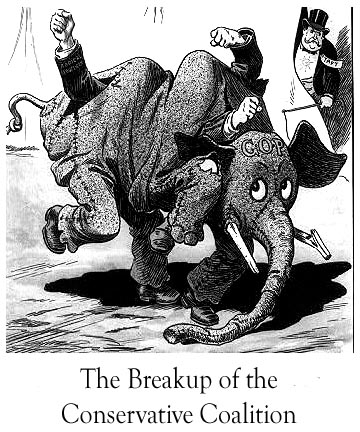Rajiv Chandrasekaran in today’s Washington Post writes that agencies in the Bush Administration and the U.S. embassy in Baghdad are not playing well with each other.
Instead of collaborating, agencies have often found themselves split by the gulf between idealistic officials in Washington, some of whom have never been to Iraq, and embassy staffers whose ambition to promote change has been attenuated by the violence and dysfunction they witness every day.
The disagreements often center on arcane subjects — such as tariff policy or the rehabilitation of state-owned enterprises — but the impact can be profound, according to people on both sides of the fights. Embassy staffers said they have wasted countless hours squabbling with Washington instead of focusing on more urgent initiatives to stabilize Iraq. In one incident, as the bickering between Commerce and State intensified, the embassy blocked a team of Commerce officials from entering the country.
Most of the article discusses an Iraqi food distribution program that the idealists in Washington want eliminated.
Some background: Last year at a Camp David meeting, President Bush requested that the departments of agriculture, commerce and energy get more involved in Iraq. Commerce Secretary Carlos M. Gutierrez then asked his staff to draw up a list of Iraq-related projects. Two months later, Commerce sent its list to Baghdad and waited for the embassy to shower them with gratitude.
Instead, the document, “Secretary Gutierrez’s Five Priority Areas for Economic Reform in Iraq,” set off a bureaucratic grenade in Baghdad’s Green Zone. The second item on the list called for the United States to pressure Iraq’s government to cease providing people with monthly food rations, which more than half of Iraq’s population relies on for sustenance.
Embassy officials were incensed. Although the embassy’s economists favored changes to the ration system, they believed that dismantling it as Commerce was proposing could spark riots that might topple the Iraqi government.
“Commerce was stunningly naive,” said a senior State Department official involved in Iraq policy. “They were way out of their lane.”
Part of the problem seems to come from what one means by “help.” When the State Department and the Baghdad embassy say they want help, they seem to mean they want more people and resources. But the Washington idealists think that “helping” in Iraq means thinking up better policies and telling the Baghdad crew what to do.
Some at Commerce regard embassy staffers and their bosses at the State Department as ungrateful and unwilling to embrace others’ ideas — even as Secretary of State Condoleezza Rice pleads with other federal agencies to send more people to Iraq. “We were willing to help, as the president asked us to do, but the State Department feels that it has control of the situation,” said a senior Commerce official involved in the food-ration policy.
Officials at State contend that they do want other federal departments to assist in Iraq, but they said they are less interested in policies that are developed by those agencies in Washington and imposed on Baghdad.
“The problem stems from this view at the White House that the whole Cabinet has to be involved,” the senior State Department official said.
The result, an embassy official with direct knowledge of the food-ration debate said, is that “there are too many cooks in the kitchen.”
The ration program has been going on since sanctions were imposed on Iraq after the Gulf War. In 2003, when L. Paul Bremer’s Coalition Provisional Authority was running Iraq, Bremer wanted to dismantle the program because it interfered with the CPA’s plans to promote capitalism. (Bremer, you might recall, is the same genius who dismantled the Iraqi Army.) The U.S. military objected, saying that there was enough social unrest going on as it was.
Then last year the Commerce Department delivered its list of nifty policy ideas to the Baghdad embassy, touching off months of squabbling. Then Susan Hamrock, the director of Commerce’s Iraq task force, and one of her subordinates, Stephen L. Green, asked the embassy for permission to visit Baghdad. Hamrock wanted to bypass the Embassy and talk directly to the Iraqi minister responsible for the food distribution system. The Embassy refused to give Hamrock and Green clearance to visit the Green Zone. Then Hamrock found out the minister would be attending a conference in Brussels.
Hamrock and Green flew to Brussels to see the Iraqis. According to Hamrock’s written summary of the meeting, they discussed changes in the ration system.
Since then, the Commerce official said, Hamrock and other Commerce officials have continued to discuss the ration system with Iraqi officials over the phone and by e-mail.
The minister and other Iraqi officials “fully support our efforts,” the Commerce official said.
The trade minister, Abdul Falah al-Sudani, could not be reached for a comment.
However, it seems that in Iraq, “full support” may not mean full support, exactly. So far, the only reform the Iraqis have been willing to make is to exclude senior government officials from receiving rations.
Commerce isn’t giving up. Hamrock’s boss, Franklin L. Lavin, the undersecretary for international trade, wants “free-market solutions” for the food problem.
Last month, Lavin traveled to Iraq to meet with trade ministry officials. His PowerPoint presentation included an exhortation to revise the ration system by providing handouts only to the needy.
The Iraqi officials present nodded in agreement. But that is about all they have done, embassy officials said.
“No Iraqi politician wants to get rid of free food. It’s political suicide. They’re not going to do it,” said a former embassy official who worked on ration-related issues. “These grand schemes are irrelevant. I can’t tell you how many hundreds of hours everyone has wasted on this issue, when there were all sorts of more productive things they could have been doing with their time.”
What is it with Bushies and Powerpoint presentations? Anyway, I thought this bit was illuminating [emphasis added] —
Commerce was not the embassy economic section’s only concern when it came to rations. Last fall, the embassy’s Joint Strategic Planning and Assessment Office, headed by a Rand Corp. analyst on contract with the embassy, created its own plan to restructure the ration system. It was even more aggressive than Commerce’s. It called for eliminating the rations in 38 weeks …
… The officers convened a working group composed of representatives from the economic section, the planning office, the U.S. Agency for International Development, the U.S. military command and the State Department’s Iraq Reconstruction and Management Office. No Iraqis were invited, according to the two embassy officials.
We keep saying we want Iraqis to take charge of their own country, and then we go right ahead and impose our solutions to their problems.
Over the course of several meetings last fall, the participants who were not from the strategic planning office chipped away at the 38-week proposal. They eventually reached a compromise: The ration system would cease by the end of 2008 — in more than 100 weeks.
To the embassy’s economists, saying they wanted to kill the program in two years was an elaborate ploy, the embassy officials said. It would get them on the record as favoring major changes, but the timeframe almost certainly meant it would not happen. “Things in Iraq change every six months,” the first embassy official said. “If you say you plan to do something in two years, it means you’ll never do it.”
There are other programs that the embassy and the agencies are fighting over, and I’m not certain the agencies don’t have a point about some of these programs. But after all that’s happened (and gone wrong), the unflappable hubris of the Bush Administration continues to amaze me. They remind me of Old World aristocrats — the ones in movies, anyway — inbred, vain, spoiled, and privileged. Movie aristocrats are arrogant fops who get shown up by the plain spoken American hero, who (unlike the fops) is skilled and experienced and smart. Now I wonder how many Bush Administration officials it takes to screw in a light bulb. Oh, wait, they have maids for that. Never mind.


